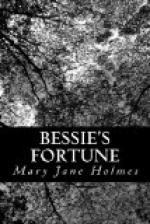“Yes, he is asleep in Jesus,” Grey whispered, while over him there stole a feeling of deep joy, mingled with remorse that he had ever doubted the goodness of his grandfather, who had prayed for and blessed him on the Thanksgiving Day which seemed so long ago.
Grey could look upon him now, and when his Aunt Hannah and his father rose to take their leave of the corpse, he went with them, lingering by the coffin after they had returned to their seats, and bending over the white, still face, where death had left a smile, so peaceful, so inexpressibly sweet that it touched the boy keenly, and stooping down he kissed the stiffened lips, and murmured, through his tears:
“Dear grandpa, forgive me for doubting you, I know you were good. I know you are in heaven.”
He spoke in a whisper and no one heard what he said, though all noted the pallor of his face and the heavy rings about his eyes, and when the next day it was rumored in town that he was very sick, no one was surprised. It was brain fever, induced by the strain upon his mental powers, and the cold he had taken that night when, unknown to any one, he had gone to the farm-house through the storm, and returned again.
For three weeks he lay at the very gates of death, watched and cared for as few boys have ever been cared for and watched, for he was the idol of hearts which would break if he were to die. The farm-house was shut up, and Hannah took her post as chief nurse to the boy she loved so much, and whose condition puzzled her a little. Once, in the first days of his illness, when, after an absence of an hour or so, she re-entered the room, where his father was keeping watch, he lifted his bright, fever-stricken eyes to her face, and asked:
“Who was the man?”
“What man?” Hannah and her brother asked, simultaneously, a great fear in the heart of each lest the other had betrayed what Grey was not to know.
“Have you told him?” Burton whispered to his sister, who answered:
“You know I have not.” Then, turning to Grey, who was still looking at her, she said to him again: “What man?”
For a moment the wild, bright eyes regarded her fixedly; then there seemed to come over the boy a gleam of reason, and he replied:
“I don’t know.”
After that he never mentioned the man again, or in any way alluded to the secret weighing so heavily upon the two who watched him so constantly—Hannah and his father. Not a word ever passed between them either on the subject, so anxious were they for the life of the lad, who in his delirium talked constantly of the past, of Europe, and the ship, and the mountains he had climbed, and whose names were on his Alpenstock. Again he was at Carnarvon, going over the old castle, and again at Melrose, fighting on the fourth of July with Neil McPherson, who had said his mother was not a lady. Then there were quieter moods, when he talked of and to little Bessie McPherson, whom he had never seen, but who came to him in his delirium, and, with her sunny blue eyes and golden hair, hovered around his bed, while he questioned her of the little room high up in the hotel, where she went without her dinner so often, while her heartless mother dined luxuriantly.




